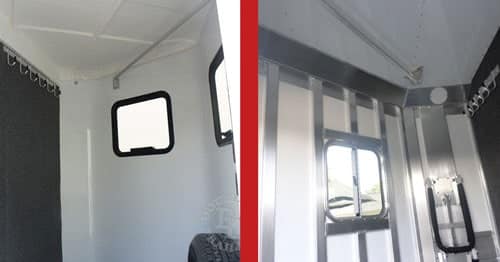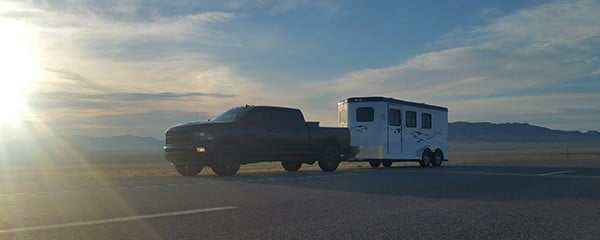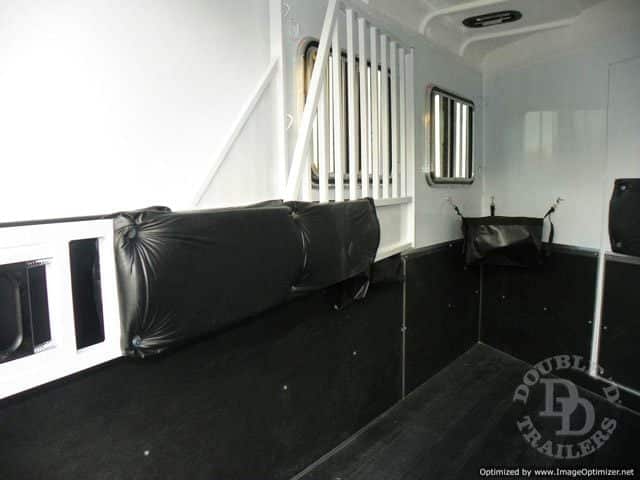Three Ways Insulation Matters to Horse Safety
If you were to build a new home, you would take great care when installing installation within the roof and walls. Just think about it. Without that insulation, the cold winds of winter would just blast right through. And without insulation, your air conditioned home would turn into a summer sweat sauna.
Insulation is pretty important on a horse trailer as well. It helps keep the horses comfortable and calm while driving down the road. And we’re not just talking about high-end living quarters horse trailers. Rather, every horse trailer – big or small – should have proper insulation installed.
(Photo top - red Xs indicate areas on this trailer without insulation. They have only a single layer of metal on the walls and roof.)
Here are three big ways that insulation matters when it comes to horse trailer comfort and safety:
Insulation helps maintain a safe trailer temperature.
We’ll start with the most important role of insulation… temperature control!
Yes, just like in your home, insulation will help control the temperature inside your trailer. This helps on those hot summer days when the heat index exceeds 90 degrees. It also helps on the coldest of cold days when traveling down the highway is likely to freeze the snot out of your horse’s nose.
Other trailer brands often build their trailers with a single layer of aluminum sheet metal surrounding the horse area. Aluminum is an excellent conductor of heat, so any temperature felt outside is quickly transferred inwards to your horses. It doesn’t take much for an aluminum horse trailer to turn into an oven on wheels.
Check out this video to see how the temperature can sky-rocket in an uninsulated trailer.
In addition, these trailers are often built with metal rivets evenly spaced along the side of the wall. These holes provide a pathway for corroding moisture to seep into the bones of the trailer. Plus, they cause a metal-on-metal noise that can be disturbing for your horse.
In a properly insulated trailer, the walls of the horse area should be built with two layers of material. Here at Double D Trailers, we use a layer of 0.04 gauge aluminum metal for the outer layer. Then, we use 16 gauge Galvalite metal for the inner layer.
To the naked eye, Galvalite looks very similar to the aluminum but it’s actually 5 times stronger! That’s because it’s made of zinc metal. In fact, it’s the same non-corrosive metal you find on roofs on many luxury beach homes.
Working in perfect harmony, our double layer insulated horse area will help maintain a much safer interior temperature for your horses. It won’t get too hot in the summer or too cold in the winter. Perfect, just like Goldilocks!

Brad Heath, owner of Double D Trailers, explained, “Other companies think it’s not quite as important to insulate the front tack area on a bumper pull trailer since most folks don’t spend much time in there. But, on a gooseneck trailer, a lot of people will camp out and sleep in there. Even on a bumper pull the heat from a non-insulated trailer is very unpleasant.”
(See photo above to compare insulated (left) vs. non-insulated (right) interior walls in a trailer dressing room.)
In our experience, dealers will often order trailers from a manufacturer with added insulation -- as a more expensive option -- for the horse area side walls and roof. However, it’s rare to find a trailer with an insulated front dressing area.
An easy way to recognize insulation is by looking at the interior walls. If vertical metal supports are visible, the trailer’s front area is uninsulated and will become very hot. If the walls of the dressing room are smooth, you have insulation for a much more comfortable human space.
Insulation helps reduce roadway noise.
The next way insulation helps has to do with noise.
When you and your family travel down the highway, you problem don’t notice roadway noise too much. The honk of the 18-wheeler truck or the sound of the motorcycle’s engine is just background noise to your radio’s soundtrack of the latest hits.
But for your horse, these sounds can be much louder… and terrifying.
“I’ve actually ridden in horse trailers while they were on the road and some are pretty loud,” Brad shared. “In particular, single skin uninsulated trailers with only one layer of sheet metal surrounding the horse compartment shake, rattle, and vibrate. At times, the sound is like someone is on the outside of the trailer banging with both hands on the side walls!”
When your horse is scared and stressed, his body reacts by releasing the cortisol stress hormone. The result is a horse that gets off the trailer nervous and sweaty. He’s all worked up and not ready to perform in your show or event.

Here’s where insulation comes in. In a well-insulated horse trailer, your horse won’t be exposed to as many of those roadway sounds as he would in a non-insulated trailer. The double layer of material on the walls will actually dampen outside roadway noise.
We’ve already talked about the walls of a trailer, but think about the roof and the flooring. An insulated roof – like our SafeBump roof – will help lessen the sounds of the rain when it decides to downpour midway through your trip. An insulated flooring material – like our synthetic Rumber – will lessen the noise of rumble strips and rough pavement.
In short, an insulated trailer will help calm your horse’s trailer fear by providing him with a quiet ride.
Insulation provide protection and strength.
As if temperature control and sound dampening weren’t enough, there’s one more way that insulation can affect your horse’s safety… pure strength!
Since an insulated trailer is double-walled, it can better withstand the force of your horse’s hooves when he decides to kick or paw. A rearing horse could literally punch a hole through a thin single-layered trailer. That’s why all of our trailers have double layered insulation.

Since it is made in a mold, there are no seams for moisture to seep through. It is insulated for temperature control and also made of a flexible material to protect your horse’s head if he rears.
Evenly spaced Z-frame supports within this roof create a cage of protection to keep your horse within the trailer in case of a catastrophic accident and roll.
Finally, SafeBump roofs are built without bolts, rivets, screws or fasteners inside the horse area to eliminate as many potential sources of injury as possible.
So, there you have it. Insulation will keep your horses safer by: 1) controlling temperature, 2) dampening noise, and 3) providing strength and protection.
If you have any questions about trailer insulation, please drop Brad at a line. He’d be happy to help!

